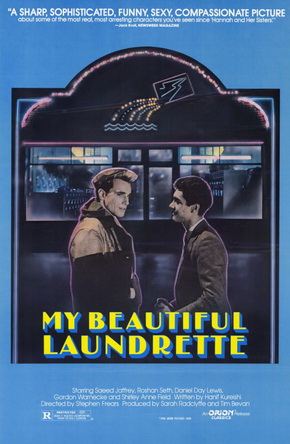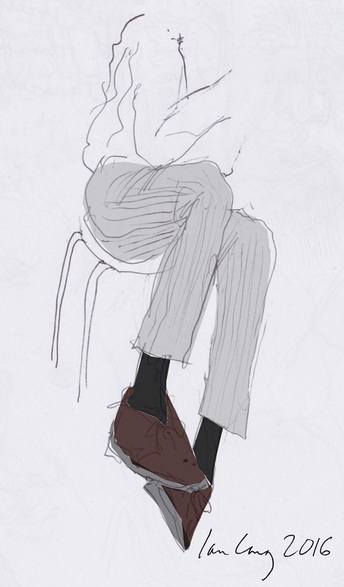|
Co-Chairman and Co-Founder of Working Title Films, Tim Bevan has made more successful movies than any other producer in British cinema, and created what is effectively Britain's only major studio. Charles Harris interviewed him for Euroscript at the BFI. Article and Illustrations by Ian Long “Be bold,” says Tim Bevan, smiling at the throng of attentive faces in a jam-packed BFI Blue Room. “You have to have a ‘take.’ It’s better to fail triumphantly than be boring. I don’t want to see bland movies.” This was the final takeaway from a conversation during which they’d arrived as regularly as sushi in a well-run Japanese restaurant. It’s easy to see how Tim has enthused so many of our leading directors, writers, actors and financiers with his projects for more than thirty years. Cutting a seemingly languid figure in shades of grey and chocolate-brown desert boots, he nevertheless has the ability to cram volumes into his engaging flood of information – and to make it all interesting. The Blue Room was rapt. Beginnings To kick off proceedings Charles offered a brief question about the early days of Working Title and Tim was away, giving us a whistle-stop tour of its beginnings as a music video company, the (not always successful) decision to get established film directors involved in the making of pop videos, and then the big step into feature production. “Channel Four went round all the theatres in Britain, getting the resident playwrights to write something,” he said. And from this process emerged Hanif Kureishi’s story of middle-class suburban Asian life, homosexuality, and the automated washing of clothes – “a world we knew nothing about.” My Beautiful Laundrette was a big success, and over the next few years the company made a string of well-received features. All seemed set fair. However, there was a big ‘but’ coming with respect to the early days of Working Title. The Development Process “We weren’t spending enough time on scripts,” Tim admitted. “To be in this business properly you need to develop scripts, work on them for a length of time. But you also have to be able to get to the end of the process and say, ‘it’s not good enough to make.’ Even after £800,000-worth of development. Better an £800,000 hit than an £8,000,000 hit. Quality control starts at the beginning and goes all the way through – that’s something we learned from Stephen Frears.” Ah yes, Frears – the multifaceted maverick who directed Laundrette, and the quintessential writer’s director: a man who prizes screenwriters’ contributions so highly that he actively wants them on set, providing tweaks and rewrites, rather than hoping they just go away once they’ve delivered their final draft. Perhaps it was indeed Frears’ influence that led Working Title to place writing at the very centre of its endeavours, and to put so much energy into the development process. But where do the stories come from? Tim said Working Title tends to source its stories from three main areas:
The Story Process If an interesting project arrives with no writer attached, a list of possible screenwriters will be drawn up – “new, mediocre and high-end” - the idea will be circulated to them, and when the right person shows interest, they’ll be asked to prepare a short (two-page) document outlining their ideas for the shape of the story: the overall feel, and how the acts will divide. Meetings will then be held to get a strong sense of the story’s genre and hooks, perhaps ‘carding’ it on a wall with colour coding for different kinds of scenes (action, romance, etc). After this, the first draft is expected to nail down the main journey or arc; the subsequent development process will mainly be concerned with “making the story come alive.” Writers' Rooms Increasingly, Working Title is making use of writers’ rooms to brainstorm story ideas for their films – just like American TV series. “The dividing lines between the various writing disciplines are getting more and more blurred,” Tim said, admitting that if he could change one thing about the way he operated in the past, he'd use TV as a platform for getting films made. Writers’ rooms are also useful for getting “new blood” into the company – something which is evidently important to Tim, as he used the phrase more than once. Interestingly, he feels that British theatre is currently more vibrant than either film or TV; producers routinely visit fringe and other productions in search of talent. He also thinks that a new British comedy genre could be on the verge of arriving, which will eclipse the present vogue for gross-out humour. The Future
Looking ahead, Tim cautioned that due to the ubiquity of digitalisation, “the old model won’t exist in ten years.” He went on to speak about the competition posed to films by flat-screen TVs in homes, and the availability of high quality, low cost stories on streaming services like Netflix. All this means that companies like Working Title must become ever more stringent about quality control. “We have to be so much stricter now,” Tim said. Certain story elements are de rigeur: “As a writer, you need an amazing hook. And there has to be a ‘movie-star’ part.” Tim advised writers to "be hard on their own material," offering the example of Joel and Ethan Coen as film-makers who are so disciplined in their writing, storyboarding and shooting that they rarely need to cut anything. He also spoke approvingly of a director he’s currently working with who, even while outlining a nascent story, is already thinking about ‘trailer moments’; bits of action that will sell the finished film in cinemas. Tim Bevan is clearly passionate about films and stories – he stressed that he’s always been driven by getting good work made, rather than obsessing about ‘The Deal’ - but it was sometimes hard to square his dictum to “be bold” with the ever tighter demands that he sees commercial considerations making on material. No doubt this contradiction is something that he is struggling with, along with everyone else creatively involved with film. However, the good news about the new digital world in which we’re now immersed is its insatiable need for content. And, as Tim put it, “the new model will play far more than ever before to the individual.” One Last Tip - The Cutting-Room Reminding us of the wisdom that films are made not once but numerous times, at the stages of conception, writing, shooting and, finally, editing, Tim advised writers to get deeply acquainted with the last process on the list. “One of the critical things for a writer to do is to get into the cutting-room,” he said, explaining that it’s through witnessing the editor's craft, standing at her elbow, that the “power of the image” is revealed – and we see how whole scenes can be discarded in favour of a single glance or gesture. Tim told us that Richard Curtis is one writer who haunts the cutting–rooms of the films he works on. And it doesn’t seem to have done his career any harm.
5 Comments
daniel Cooper-kamodsky
11/3/2016 12:20:07 pm
Excellent and honest insight into the development processes at the Working Title by its co-founder! Also, truly encouraging words from Tim for every up and coming screenwriter who attended that jam-packed event at BFI organised by the Euroscript two days ago ! Personally for me - it was a very significant evening too as I have two speculative scripts - a psychological thriller the Boys Succession ( received an excellent review from the BlueCat Screenplay competition, though did not progress to the final stages) and Amandas's Covention (still in competition at The PAGE International Screenwriting Awards 2016) . These two scripts are practically ready to be presented to the development executive of the big studios ( as is quite often the case for many British talents - it is going to be primarily in the USA) and another script for an epic action thriller movie entitled '1986' is still in the early stages of the development! Thank you for that treat, EUROSCRIPT!
Reply
Ian Long
11/3/2016 02:51:21 pm
I'm delighted to hear that you found the evening interesting and enjoyable, Daniel.
Reply
Daniel Cooper-Kamodsky
13/3/2016 12:07:18 am
Thank you Ian. I’ve also shared the link to this interview with the other participants and also on my FB. By the by, you put the whole report very well with the headings, your analysis and even sketches, delicately avoiding what was said 'off the record'! Brilliant! I guess that every up and coming screenwriter will find enough in that report to fully understand how one of the most successful film production houses operates and especially its script development department functions. In addition, during the Q&A , Tim treated audience with such respect and revealed so many rarely heard facts how they conduct their business at the Working Title, obviously from the creative perspective. At some moments I almost felt if I was sitting in the ‘Writer's Room’ in their development office. It was like a journey into the world of the professional conduct where you instantly memorise every buzz word ( such as a ‘water-cooler talk’) because I liked it and enjoyed the ‘show’!
Reply
Ian Long
13/3/2016 10:07:23 am
I agree, Daniel - many writers fail to realise that tension and suspense can operate on a very nuanced emotional level, as well as via action or violence. It really depends on the genre of the film. In some stories, like Philomena, quite subtle changes in characters can make for a satisfying narrative. Another example would be Shadowlands, about the emotional awakning of a professor in late middle age.
Reply
Daniel Cooper-Kamodsky
13/3/2016 12:23:50 pm
Totally agree with you, Ian. I have not seen Shadowlands but I'll definitely watch it! Leave a Reply. |
BLOGTHE ONLY PLACE TO TALK ABOUT THE CRAFT OF SCRIPTWRITING.
|
Privacy Policy © Euroscript Limited 2020




 RSS Feed
RSS Feed


